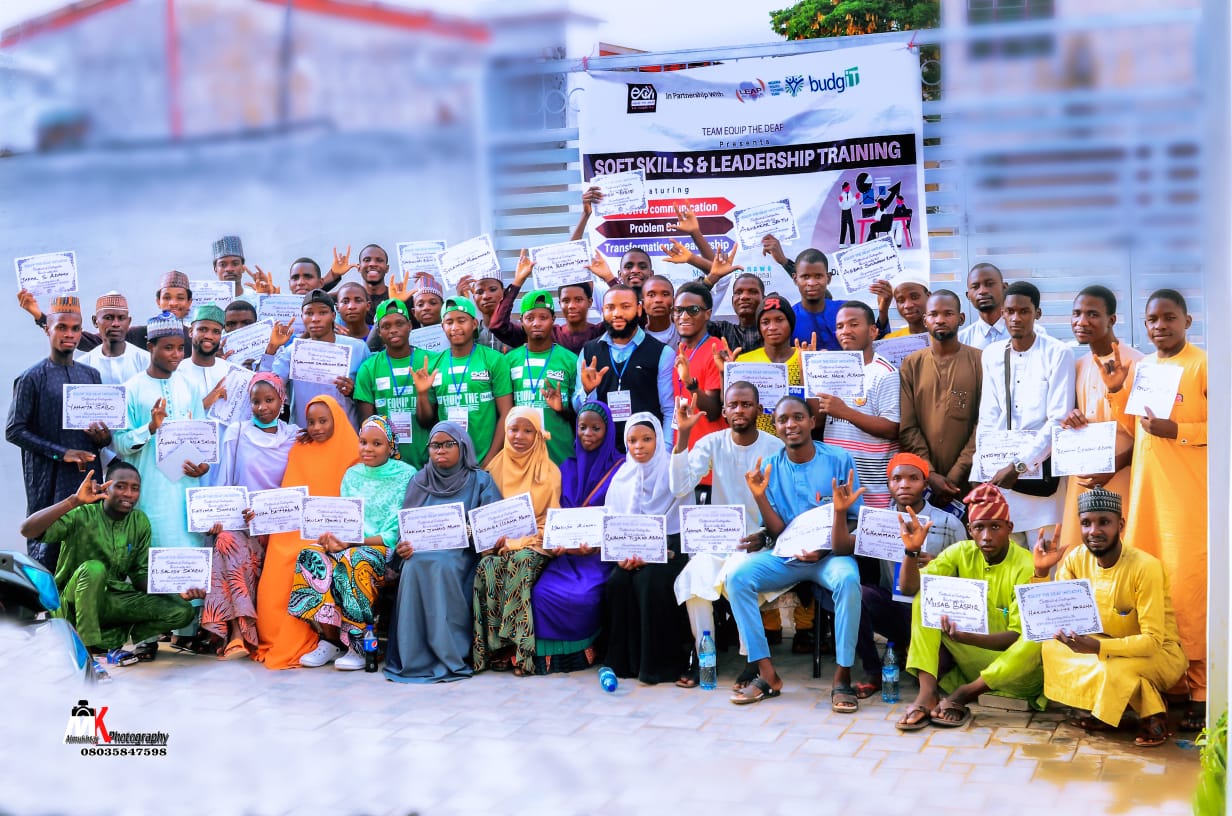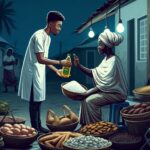Growing up in Kurna Asabe, a community in Dala Local Government Area of Nigeria’s Kano State, Zulkifil Aminu was one of the students at Tudun Fulani Special Primary School. He was the favourite of his teachers until he fell ill in 2007 and spent months in the hospital battling meningitis, a bacterial and viral infection of the fluid surrounding the brain and spinal cord.
Aminu later lost his hearing. “I think it was after an injection that I suddenly became deaf. I can’t remember being sad about losing my hearing. During that time, I was still hanging around with my childhood friends, who could listen to me even if I couldn’t hear them. They didn’t ridicule me. I faced ridicule only from children that we didn’t grow up together,” He recounted.
After losing his hearing, Aminu had to withdraw from the school he was attending as he faced a challenge of learning and was being bullied. His father enrolled him in Primary Two at Gobirawa Project Primary School, a special education school for children with hearing impairments.
Despite being deaf, Aminu could still speak and write fluently in English and Hausa. He developed a genuine passion for learning.
“Before turning deaf, I loved music and stories. I used to take my grandmother’s receiver and sneak out so I could listen to music and stories. I remember the stories they used to broadcast every Thursday on Freedom Radio. Some of the stories I used to listen to then were tagged Kundin Tsatsuba. Sometimes, I would force my father to buy me English newspapers every day when he came back from work so I could read and become a good English writer,” Aminu said.
Following his graduation from primary school, Aminu moved to another special education school in Tudun Maliki, he continued from JSS 1 to SSS three.
In 2019, he took the Senior School Certificate Examination or SSCE and the Unified Tertiary Matriculation Examination or UTME and got good grades but didn’t gain admission into the university. He made another attempt in 2020 and was admitted to Bayero University Kano to study Special Education and Sociology.
Empowering the deaf community with soft skills.
Aminu is one of the 9.5 million Nigerians estimated to be deaf, according to the UN. However, he never knew that he had the potential to start an initiative.
It all began when he applied and got selected for the Youth Leadership Development Programme or YLDP at LEAP Africa in March 2023, where he was taught 20 courses on Leadership and Advocacy. The fellowship required the participants to choose either a sustainability project or an advocacy project. Each fellow who chooses the sustainability project is expected to carry out a community project, while those who choose to do a project on Advocacy will engage in meetings and dialogues with stakeholders concerning national development.
“I chose the sustainability project, and we were asked to create a project proposal. I then built a team of three people. They didn’t seem to have any idea on how to go about it, so I reached out to Hannatu Suleiman Abba, one of my coursemates who I believed could be of help because she is a journalist and advocate for the rights of persons with disabilities. After my conversation with her, I returned to the hostel and started working on the proposal and later submitted it,” Aminu explained.
A few weeks after he submitted the proposal, he received a congratulatory message from LEAP Africa that his proposal had been selected and won a grant of $500. So, he and his team were paired with a mentor from the organisation to guide them in implementing the project.
It was with this support that Aminu started the EQUIP THE DEAF INITIATIVE, fueled by his desire to see a community where persons with hearing impairment would not only realise and achieve their dreams but also acquire the soft skills needed to help them excel in their professional careers.
In July 2023, the project mobilised deaf students from the Special Education School Tudun Maliki, Sa’adatu Rimi College of Education Kano, Bayero University Kano, and those who are out of school.
Through collaborations with the Kanawa Educational Foundation for the Disabled or KEFD and the Centre For Information Technology and Development or CITAD, 55 persons with hearing impairment benefited by learning effective communication, transformative leadership, and problem-solving skills. Also, the participants received writing materials, refreshments, and certificates at the end of the project.
The project has made a positive impact on the lives of participants like Adamu Alhassan.
“The training helped me to transform myself. I learned how to communicate effectively through writing and sign language. Today, my messages are mostly delivered clearly. I’m also passing on the skill to other people who didn’t participate in the program,” Alhassan said.
For Auwal Ismaila Salisu, the project is an eye-opener, and he is now utilizing the knowledge he gained to interact with people and even solve conflicts between two parties.
He is also a teacher at Universal Primary School Rano. “Putting it into practice is the best way of utilizing any knowledge gained. You see, I’m a teacher, and the training gives me more insight into how to go along with every student in my class,” Salisu told Prime Progress.
Challenges
Aminu was just a child when he lost his hearing, so he can’t recall any discrimination due to his condition during that time. Today, he views himself as equal to every young person out there. Even if he faces discrimination, he pays it no attention.
According to Aminu, the project he undertook also encountered challenges, such as ineffective preparation and inadequate funds. However, he paid close attention to every detail and hopes to avoid repeating the same mistakes in the future.
“We arrived at the venue and started about two hours after the scheduled time. We needed better equipment, which we had to wait for to be brought to the venue. We also incurred expenses that put a heavy strain on our budget, making us unable to settle other costs. I had to borrow extra funds from a friend and pay him back later after the second tranche of the funds was disbursed to us,” Aminu told Prime Progress.
Beyond the challenges, Aminu believes that God allowed him to be deaf for a reason. “Perhaps because the deaf community needs people like me to contribute to changing the narratives,” he added.
While Aminu continues his studies and community services, he envisions expanding the initiative to train and empower thousands of youths with hearing impairments in Nigeria.
“I have many projects for the deaf community, particularly regarding access to quality education. All I need is the necessary support to implement them,” he concluded.
Zulkifil Aminu, from Kurna Asabe in Kano State, Nigeria, faced a major life change after contracting meningitis in 2007, which led to hearing loss. Despite withdrawing from school due to bullying and the challenge of learning with his impairment, Aminu pursued education fervently, eventually graduating from primary school and attending a special education school.
Aminu's passion for learning persisted, leading him to perform well in the SSCE and UTME exams before gaining admission to Bayero University Kano to study Special Education and Sociology. In 2023, Aminu joined the Youth Leadership Development Programme (YLDP) at LEAP Africa, where he was inspired to create the EQUIP THE DEAF INITIATIVE after winning a $500 grant. This initiative aimed to empower the deaf community by teaching soft skills such as communication, leadership, and problem-solving.
The project, launched in July 2023, involved collaborations with the Kanawa Educational Foundation for the Disabled and CITAD, benefiting 55 deaf individuals with training and support. Participants, like Adamu Alhassan and Auwal Ismaila Salisu, reported significant personal growth and practical application of the skills learned.
Aminu acknowledges the challenges faced during the project, including inadequate preparation and funding issues, but remains optimistic about expanding the initiative. He envisions further projects to enhance access to quality education for the deaf community in Nigeria.






